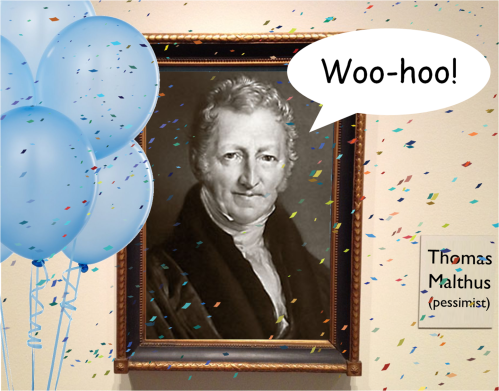 The theme of the upcoming 2014 annual conference of the American Evaluation Association (AEA) challenges participants to consider how evaluation can contribute to a sustainable and equitable future. It’s a fantastic challenge, one that cuts to the core of why evaluation matters—its potential to promote the public good locally and globally, today and in the future.
The theme of the upcoming 2014 annual conference of the American Evaluation Association (AEA) challenges participants to consider how evaluation can contribute to a sustainable and equitable future. It’s a fantastic challenge, one that cuts to the core of why evaluation matters—its potential to promote the public good locally and globally, today and in the future.
As I prepare my presentations, I want to share some of my thoughts and encourage others to take up the challenge.
The End is Nigh(ish)
The natural and social environments in which we live have limits. Exceed them, and society puts itself at risk.
It’s a simple idea, but one that did not enter the public’s thinking until Thomas Malthus wrote about it in the late 18th century. He famously predicted that, unless something changed, the British population would soon grow too large to feed itself. As it turns out, something did change—among other things, merchants imported food—and the crisis never came to pass.
Today, Malthus is strongly—and unjustly—associated with, as Lauren F. Landsburg put it, “a pessimistic prediction of the lock-step demise of a humanity doomed to starvation via overpopulation.” This jolly point of view is sometimes referred to as Malthusianism, and applied to all forms of catastrophic environmental and social decline.
The underlying concept Malthus articulated—there are real environmental and societal limits, and real consequences for exceeding them—is not controversial. There are, however, controversial perspectives related to it, including:
- “Malthusiasm”: A passionate belief in—bordering on enthusiasm for—the inevitability of environmental and social collapse, especially in the short term.
- Denialism: An equally passionate belief that predictions of environmental and social disaster, like those made by Malthus, never come to pass.
- Self-correctionism: A belief that many small, undirected changes in individual and organizational behavior, related primarily to markets and other social structures, will naturally correct for problems in complex ways that may, at first, be difficult to notice.
- Intentionalism: A belief that intentional action at the individual, organizational, and social levels—when well planned, executed, and evaluated—can not only help avoid disaster, but produce positive benefits that serve the public good.
I reject the first two. I hope for the third. I’ve spent my life working for the fourth—and this is where evaluation can play a significant role.
From Avoiding Disaster to Promoting Sustainability
I am as much for avoiding disaster as the next guy, but—rightly or wrongly—I expect more from organized human action. Like sustainability. It’s a concept that I and others strongly believe should guide the actions of every organization. It is also a slippery concept that we have not fully defined, making it a rough guide, at best.
So, connecting ideas from various sources (and a few of my own), I’ve developed a preliminary working definition based on a set of underlying principles (in parentheses):
Actions are sustainable when they do not affect future generations adversely (futurity), social groups differentially (equity), larger social and natural systems destructively (globality), or their own objectives negatively (complexity).
I’m not fully satisfied with the definition, but so far it has helped clarify my thinking.
Why Evaluation Matters
Unfortunately, action is only weakly linked to upholding these principles, in part because there is often a lack of information about how well the principles have been (or will be) met.
That is where evaluation comes in. If we use our skills to help design the actions of commercial and social enterprises in ways that uphold these principles, we serve the public good. If we evaluate programs in ways that shed light on these principles—which would require most of us to expand our field of view—we also serve the public good.
This is why evaluation matters—because it has the potential to serve the public good—and why we need to work together to make it matter more. That would truly be evaluation for a sustainable and equitable future.

This reminded me of a documentary I watched last night, Surviving Progress http://www.imdb.com/title/tt1462014/, which showed the real need to design and spread better solutions to our problems, so we can avoid environmental and social collapse.
I believe the need is real. And it’s important to frame our efforts not solely in terms of avoiding harm, but also creating benefits.
Absolutely!